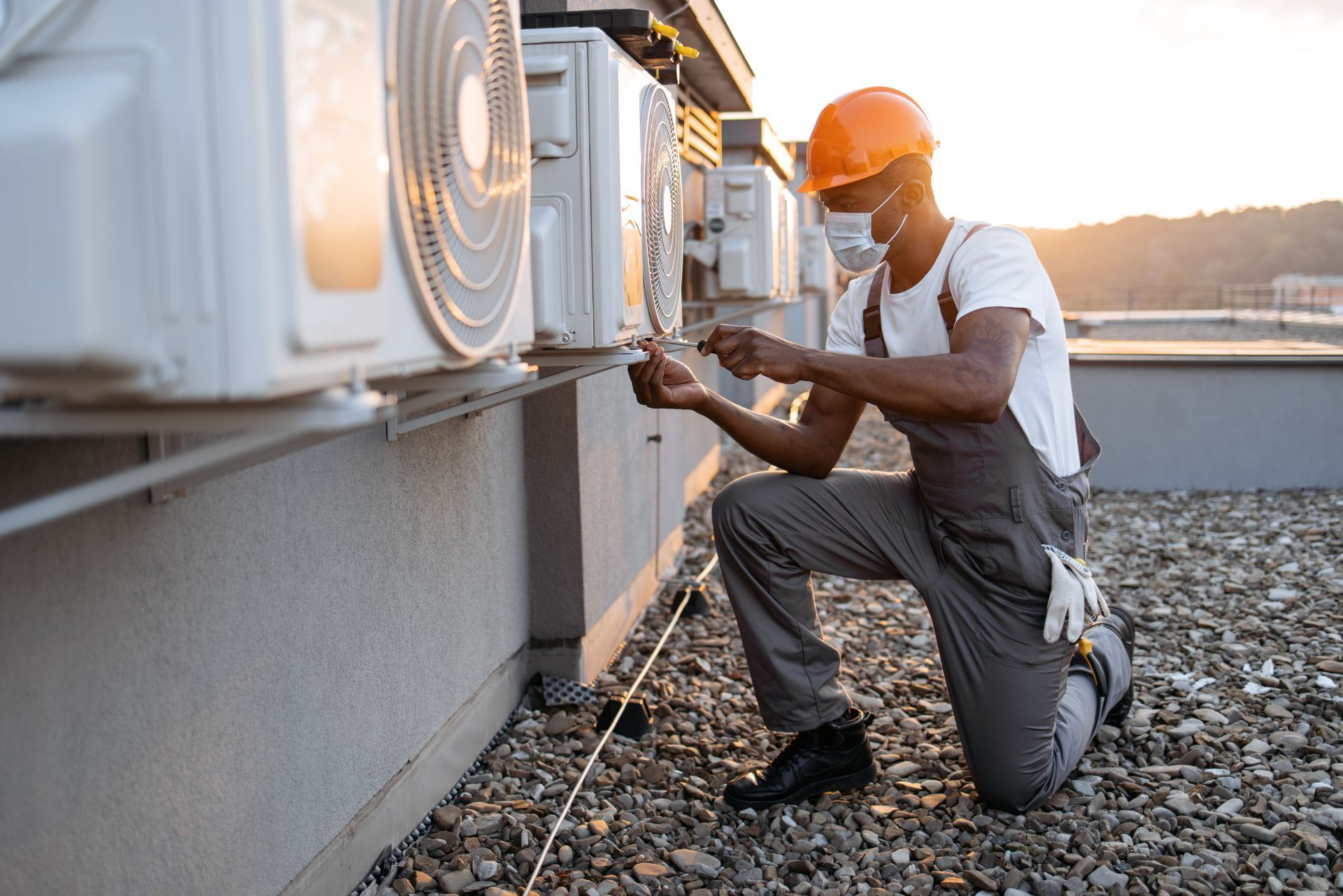Top 3 Recommended Policies

Rhode Island’s HVAC contractors are part of a growing industry that continues to expand as more homeowners and businesses invest in efficient heating and cooling systems. With over 500 companies operating across the state, competition is strong, and so are the risks. Equipment damage, liability claims, and on-site injuries can all lead to costly setbacks without proper insurance in place. This guide breaks down HVAC contractor insurance in Rhode Island, explaining why coverage matters, which policies are most important, and how to find plans that fit your business needs. With customers increasingly relying on recommendations and online reviews to choose service providers, carrying the right insurance not only protects your business but also strengthens your reputation in a competitive market.
Why HVAC Contractor Insurance is Essential in Rhode Island
Insurance is not just a regulatory formality for HVAC contractors; it’s a critical component of risk management. The nature of HVAC work—installing, repairing, and maintaining heating and cooling systems—carries inherent risks such as property damage, bodily injury, and equipment failure. Without adequate insurance, contractors can face devastating financial losses from lawsuits, medical claims, or damage to client property.
In Rhode Island, where the HVAC industry is booming with 541 establishments, competition is fierce, and customer expectations are high. Having comprehensive insurance coverage can differentiate your business by demonstrating professionalism and reliability. It also ensures compliance with state regulations and contractual requirements, especially when working with commercial clients.
Moreover, the HVAC insurance market offers tailored policies that cater specifically to contractors in this field. These typically include general liability, workers’ compensation, and commercial auto insurance, with premiums ranging from 1% to 3.5% of annual revenue, according to ContractorNerd. This flexibility allows contractors to select coverage that aligns with their business size and risk profile.
Types of Insurance Every Rhode Island HVAC Contractor Should Consider
Understanding the different types of insurance available is crucial for making the right choices. Here are the primary coverages HVAC contractors should consider:
- General Liability Insurance: Protects against third-party claims of bodily injury or property damage caused by your work.
- Workers’ Compensation Insurance: Covers medical expenses and lost wages for employees injured on the job, a legal requirement in Rhode Island for most employers.
- Commercial Auto Insurance: Essential if your business uses vehicles for transporting equipment or traveling to job sites.
- Equipment and Tools Coverage: Protects your valuable tools and equipment from theft, damage, or loss.
- Professional Liability Insurance: Also known as errors and omissions insurance, this covers claims arising from mistakes or negligence in your professional services.
Choosing the right combination depends on your business operations, workforce size, and client contracts. Many insurers offer bundled packages that can provide savings and simplify management. Additionally, understanding the nuances of each coverage type can empower contractors to make informed decisions that not only protect their business but also enhance their reputation in the industry.
In Rhode Island, the unique climate conditions can also impact the types of HVAC services that are in demand, further emphasizing the importance of specialized coverage. For instance, contractors may need to address specific challenges related to humidity control or heating efficiency during the colder months. This level of expertise can lead to more complex projects, which in turn may require additional insurance considerations, such as coverage for specialized equipment or higher liability limits. By being proactive about insurance, HVAC contractors can not only safeguard their business but also position themselves as trusted experts in a competitive market.

Cost Factors and Financing Options for HVAC Insurance in Rhode Island
Insurance premiums for HVAC contractors in Rhode Island vary based on several factors, including business size, revenue, number of employees, claims history, and coverage limits. As noted, premiums typically range between 1% and 3.5% of annual revenue, which can be a manageable investment considering the protection it offers.
For example, a small contractor generating $500,000 in annual revenue might expect to pay between $5,000 and $17,500 annually for comprehensive coverage. Larger businesses with more employees and vehicles will see higher premiums but also benefit from increased protection. Additionally, factors such as the types of services offered, the age and condition of equipment, and the geographical area serviced can influence premiums. Contractors operating in regions with harsher weather conditions or higher rates of claims may face elevated costs, making it essential to assess all variables when calculating potential insurance expenses.
To ease the financial burden, some insurance providers in Rhode Island offer flexible financing options and bundled savings. Affordable Contractors Insurance is one such company providing customized policies with financing plans and potential savings up to 25% when bundling multiple coverages. This approach not only helps contractors manage their cash flow more effectively but also encourages them to secure comprehensive coverage that they might otherwise overlook due to budget constraints. Moreover, many insurers are now offering online tools and calculators that allow contractors to estimate their premiums based on specific inputs, providing a clearer picture of their insurance needs.
Balancing Cost and Coverage
While it might be tempting to opt for the lowest premium, underinsuring can leave your business vulnerable to significant losses. It’s important to work with an insurance agent who understands the HVAC industry and can tailor coverage to your specific risks and budget. Investing in robust insurance not only protects your assets but also enhances your credibility with clients, many of whom now prioritize contractors with proven reliability and professionalism. Furthermore, having comprehensive insurance can be a deciding factor for clients when choosing between multiple contractors, as it demonstrates a commitment to quality and safety. In a competitive market, showcasing your insurance coverage can serve as a powerful marketing tool, reassuring potential customers that they are working with a responsible and trustworthy professional.
How Customer Preferences Impact HVAC Contractor Insurance Needs
The way homeowners select HVAC contractors has evolved dramatically in recent years. A survey highlighted by ACHR News found that 73% of homeowners now choose their HVAC contractor based on previous experiences, a sharp increase from 29% the year before. This trend emphasizes the power of reputation and customer satisfaction in driving business growth.
“Word of mouth,” traditionally understood as face-to-face or phone recommendations, has been “supercharged” by social media, texting, and community outreach. Contractors who maintain a strong reputation and demonstrate professionalism through proper insurance coverage are more likely to earn these valuable referrals.
In this context, having the right insurance is not just about risk management—it’s a marketing asset. Clients feel more confident hiring contractors who can prove they are insured, knowing that any mishaps will be handled responsibly. This trust translates into repeat business and positive online reviews, which are crucial in today’s digital marketplace.
Insurance as a Competitive Advantage
Given that 67% of homeowners find their HVAC contractor through recommendations, including social media, contractors who highlight their insurance coverage can stand out. Displaying certificates of insurance on websites and marketing materials reassures potential clients and can be a deciding factor in competitive bids.
Moreover, as the HVAC industry continues to face increasing competition, the nuances of customer preferences are becoming more pronounced. Homeowners are not only looking for quality service but are also inclined to choose contractors who align with their values, such as sustainability and community involvement. For instance, contractors who invest in eco-friendly practices and can showcase their insurance policies may attract a clientele that prioritizes environmental responsibility. This alignment can lead to a more loyal customer base, as homeowners feel they are supporting businesses that reflect their own beliefs.
Additionally, the rise of online reviews and platforms dedicated to contractor ratings has made transparency more critical than ever. Homeowners often research potential contractors extensively before making a decision, scrutinizing reviews that mention reliability and professionalism. Contractors with comprehensive insurance are likely to receive more favorable reviews, as clients appreciate the peace of mind that comes with knowing their contractor is prepared for any eventuality. This creates a feedback loop where positive experiences lead to more referrals, further solidifying the contractor's reputation in a crowded market.

Typical HVAC Service Costs in Rhode Island and Their Insurance Implications
Understanding the typical costs associated with HVAC services in Rhode Island helps contractors assess their insurance needs. According to HVAC Laboratory, furnace or boiler repairs in Providence range from $150 to $650, while air conditioning or heat pump repairs typically cost between $140 and $600. Complete HVAC installations can range from $7,500 to $14,000.
These figures illustrate the financial stakes involved in HVAC projects. Insurance coverage protects contractors against claims arising from property damage or faulty workmanship that could result in costly repairs or legal disputes. For instance, a damaged furnace installation that causes property damage could lead to expensive liability claims without proper insurance.
Additionally, workers’ compensation insurance is critical given the physical nature of HVAC work, which involves risks such as falls, burns, and electrical hazards. Proper coverage ensures that injured employees receive medical care without placing the financial burden on the contractor.
Planning for Insurance Based on Service Scope
Contractors with a broader service scope or higher-value projects should consider higher coverage limits to protect against larger claims. Conversely, smaller operations may opt for basic packages but should avoid underinsuring, which can jeopardize business continuity.
Moreover, the fluctuating costs of materials and labor in the HVAC industry necessitate a proactive approach to insurance planning. Contractors should regularly review their policies to ensure they reflect current market conditions and the specific risks associated with their projects. For example, the increasing complexity of HVAC systems, which now often include smart technology, may require specialized insurance that addresses new liabilities. Additionally, contractors should be aware of any local regulations or codes that could impact their insurance requirements, as non-compliance can lead to significant financial penalties.
Furthermore, maintaining a solid relationship with an insurance agent who understands the HVAC industry can provide invaluable insights. These professionals can guide contractors in selecting the most appropriate coverage options tailored to their unique business model and the specific services they offer. Regular training and updates on safety protocols can also help minimize risks on the job site, potentially leading to lower insurance premiums over time. By staying informed and prepared, HVAC contractors can safeguard their businesses against unforeseen challenges while ensuring they remain competitive in the marketplace.
Finding the Right Insurance Partner in Rhode Island
Choosing the right insurance provider is as important as selecting the right coverage. Rhode Island HVAC contractors benefit from working with insurers who understand the local market and the specific risks of the HVAC industry. Customized policies that offer flexible financing and bundled savings can make a significant difference in affordability and coverage quality.
Affordable Contractors Insurance is one example of a company offering tailored policies for Rhode Island contractors, including HVAC professionals. Their approach includes flexible payment options and potential discounts when bundling multiple insurance types, helping contractors manage costs without sacrificing protection.
When evaluating insurance providers, contractors should consider factors such as customer service responsiveness, claims handling reputation, and the ability to customize policies. Working with an experienced agent who can guide you through the complexities of HVAC insurance ensures that your coverage aligns with your business goals and risk tolerance. Additionally, it is beneficial to seek out insurers who have a proven track record in the HVAC sector, as they are more likely to understand the nuances of the trade, from equipment breakdowns to liability issues related to installation and maintenance.
Moreover, Rhode Island's unique climate can pose specific challenges for HVAC contractors, making it essential to have coverage that addresses weather-related incidents. For example, policies that include protection against damages caused by extreme weather events, such as hurricanes or heavy snow, can be invaluable. It's also wise to inquire about endorsements or riders that can be added to a policy to enhance coverage, such as those that cover loss of income due to equipment failure or business interruption. This proactive approach not only safeguards your business but also instills confidence in your clients, knowing that you are well-prepared for any unforeseen circumstances.
Tips for Working with Insurance Providers
- Request detailed quotes and compare coverage options, not just premiums.
- Ask about bundled policies and discounts for combining multiple coverages.
- Ensure the provider understands HVAC industry risks and Rhode Island regulations.
- Review policy terms carefully, including exclusions and claim procedures.
Conclusion: Protecting Your Rhode Island HVAC Business with Confidence
The HVAC industry in Rhode Island is experiencing robust growth, presenting exciting opportunities for contractors. However, with growth comes increased responsibility to manage risks effectively. Securing comprehensive insurance coverage tailored to your HVAC business is essential for protecting your assets, employees, and reputation.
From general liability and workers’ compensation to commercial auto and equipment coverage, the right insurance portfolio safeguards your operations against unforeseen events. It also enhances your credibility in a market where 73% of homeowners now choose contractors based on previous experiences, often influenced by recommendations and social media.
By partnering with knowledgeable insurance providers offering flexible financing and bundled savings, Rhode Island HVAC contractors can balance cost with comprehensive protection. This strategic approach not only secures your business but also supports sustainable growth in a competitive industry.
For more information on the Rhode Island HVAC industry and contractor insurance options, visit
IBISWorld’s industry report and explore tailored insurance solutions through providers like
Affordable Contractors Insurance.
Contact Us
HVACInsure is fully licensed and permitted to sell contractor and commercial insurance in Rhode Island.
We proudly serve clients throughout Rhode Island and maintain partnerships with local Rhode Island insurance carriers to ensure HVAC professionals receive compliant, affordable, and comprehensive coverage that meets project and regulatory requirements.
HVACInsure Focuses on Rhode Island HVAC Contractor Insurance
Providence – Cranston – Warwick – Pawtucket – East Providence – Woonsocket – Newport – Central Falls – Westerly – North Providence – Bristol – West Warwick – Coventry – Cumberland – North Kingstown – South Kingstown – Johnston – Lincoln – Smithfield – Barrington – Middletown – Burrillville – Tiverton – East Greenwich – North Smithfield
Frequently Asked Question
Common HVAC Contractor Insurance Questions in Rhode Island
These FAQs address common contractor questions. As HVACInsure grows, we will update this section with real client experiences and answers.
How does Rhode Island's small size affect my insurance options?
Rhode Island's compact geography means you can serve the whole state. We structure efficient coverage without geographic restrictions.
What coverage do I need for Rhode Island's coastal properties?
Narragansett Bay and the coast face salt air and humidity. We cover the unique challenges of shoreline HVAC work.
Do I need special coverage for Providence's commercial market?
Providence drives Rhode Island's commercial work. We cover the liability exposure and certificate requirements of urban projects.
What about coverage for Rhode Island's historic properties?
Rhode Island has many historic buildings. We cover the liability of retrofitting HVAC in properties with preservation requirements.
How do Rhode Island's licensing requirements affect my insurance?
Rhode Island requires contractor registration. We ensure your coverage meets state requirements and provide certificates for compliance.
Can I get coverage for work in Massachusetts and Connecticut too?
Absolutely. Rhode Island contractors often serve nearby states. We structure multi-state coverage that meets requirements in each area.

Still have questions?
Can’t find the answer you’re looking for? Please chat to our friendly team!

About The Author: James Jenkins
I’m James Jenkins, Founder and CEO of HVACInsure. I work with HVAC contractors and related trades to simplify insurance and make coverage easier to understand. Every day, I help business owners secure reliable protection, issue certificates quickly, and stay compliant so their teams can keep working safely and confidently.
Recognized by National HVAC Trade Associations
These trusted organizations set best practices and standards that carriers rely on when underwriting HVAC risks.
Membership signifies adherence to HVAC industry standards and contractor best practices.


